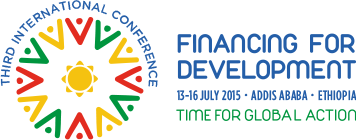The importance of data standards in mobilising FFD
by Robin Uyterlinde
15 July 2015
As the Third International Conference on Financing for Development (FFD) draws to a close, it is timely to focus on how the commitments made in Addis Ababa this week will be tracked – at a global level, but most importantly, at country level.
Throughout the FFD negotiations, a consensus has emerged on the need to mobilise all forms of development finance – public and private, domestic and international – to promote sustainable development and support the ambitious targets proposed for the post-2015 agenda. The first step in mobilising all of these resources for a common purpose is to publish information about them in a common way. As Chair of The International Aid Transparency Initiative (IATI), I believe that IATI can do just that.
IATI has developed an open data standard – the IATI Standard – which enables a wide range of organisations to publish information on their development cooperation in a common, open, electronic format. The IATI Standard can be used to publish data at the level of individual initiatives – projects and programmes, grants, loans, securities and guarantees – and it provides timely, comprehensive and forward-looking management information that meets the needs of partner countries. As a result, it is an ideal tool for publication of data that will allow analysis of financing for development at national level. Jointly with Development Initiatives, IATI has developed d-portal.org, a platform that provides a tool for real-time tracking of financing for development by country, sector or resource.
The IATI Standard is still relatively new – the first organisations only began publishing their data in 2011. Since then, it has grown rapidly, and over 340 organisations are now publishing to the IATI Registry. This includes traditional donors, multilateral institutions, national and international CSOs, philanthropic foundations, development finance institutions and private sector consultancies. The IATI Standard has demonstrated that it is flexible enough to capture data on many different types of international development finance flows. Work is underway with South-South Cooperation (SSC) providers and with the humanitarian community to extend the IATI Standard to include their specific needs. With further minor adaptations, it could capture data on all international development finance flows, so IATI provides an ideal basis for developing a fully comprehensive standard for the publication of information on international development finance flows.
For IATI to deliver on its potential, three things need to happen:
1) We need all providers of development cooperation and other development finance to publish their data to the IATI Standard.
2) We need to improve the quality of the data already published to IATI. The publishing statistics on the IATI Dashboard provide a daily snapshot of the progress that IATI publishers are making towards meeting their Busan commitment to provide timely, comprehensive and forward-looking information on their development cooperation and we are pleased to note that a number of organisations have recently made commitments to improve the quality of their data across these three critical dimensions.
3) As was emphasised at the recent IATI meetings in Ottawa, IATI data will only have an impact on development outcomes when it is used, so we need to step-up our work with stakeholders at country level to increase the use of IATI data, for example by importing that data directly into country-based aid management and budget systems.
At our joint side-event on data standards in Addis Ababa yesterday, there was strong support for meeting these challenges, and for making IATI the standard for tracking all financing for development.

